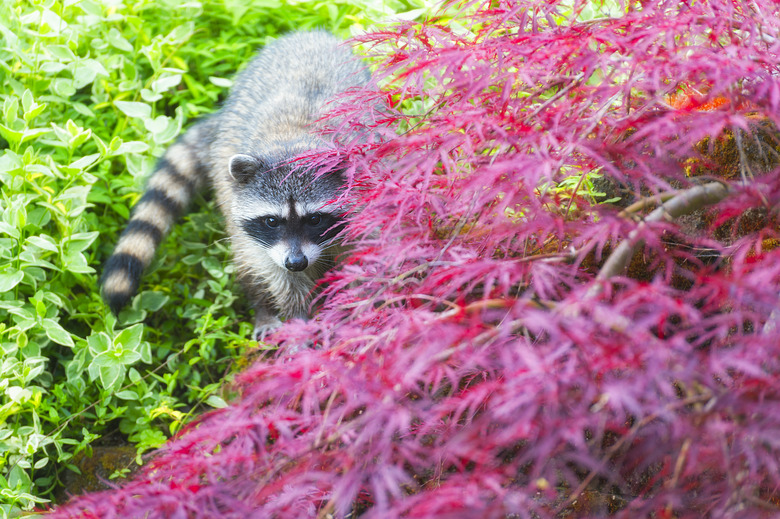How To Deter Raccoons From Digging In Your Yard
We may receive a commission on purchases made from links.
Supreme masters of coexisting with humans, raccoons quickly learn the benefits of exploiting our stuff, including our lawns. Intelligent, opportunistic, and even downright cute, each raccoon has the ability to trash our yards and gardens and cause significant damage to buildings and other structures. Worse, they carry numerous internal parasites and diseases, including roundworms and rabies, all of which can be shared with humans. Because they are also carriers of distemper and parvo, raccoons are potentially dangerous to your pets as well.
There's nothing unusual or awful about a single visit from an itinerant raccoon who is just passing through. However, if the animal seems to be hanging around for more than a single night or two, it's time to roll up the welcome mat.
Identify the Hole Digger
Identify the Hole Digger
Raccoons aren't the only lawn wreckers around. You'll need to identify your midnight excavators correctly in order to successfully evict them. Skunks, moles, voles, gophers, and groundhogs could also be the culprits. If the only evidence seems to be holes in the yard, examine the damage closely. Unlike other nocturnal marauders, raccoons don't create holes. Rather, they use their front paws like hands, digging, rolling, lifting, and tearing off chunks of sod or turf and flipping them over. This makes it easy to collect grubs and other delectables from the grass roots.
Additional clues may include droppings, tracks, and other feeding evidence. In severe cases wherein the animal has homesteaded, you may also hear noises coming from your chimney, roof, walls, basement, or attic.
Eliminate the Food Source
Eliminate the Food Source
Raccoons decimate lawns for one reason: abundant food. Grubs — soil-dwelling insect larvae — are raccoon delicacies, and they'll destroy your turf by digging for the beasties. Remove the rewards and the raccoon will leave to seek its fortune elsewhere.
Chemical grub control products are readily available. However, for a far more environmentally friendly approach, treat your yard with beneficial nematodes. Safe for you, your pets, and earthworms, these microscopic roundworms occur naturally in soil and are highly effective natural pest control. As voracious predators, nematodes destroy lawn grubs and remain effective for about two years.
Apply the nematodes according to the package instructions when the ground warms in spring until late September. Do not follow up this treatment with any insecticides, which will kill your nematodes.
Other Helpful Tactics
Other Helpful Tactics
Reinforce your message to the raccoon wrecking crew with some other tactics to make your visitors feel unwelcome. For best results, employ as many tactics as you can simultaneously and vary your approach by changing up your efforts every day or two.
- Remove
other food sources. Secure garbage cans and compost bins with
lids that masked marauders can't remove. Bungee cords work well. Clean up under bird feeders and take them inside at
sundown. Feed your pets indoors and remove outdoor food and water
dishes overnight. - Give
your yard a drink while harassing the raccoons by installing
motion-activated sprinklers in your yard. These gadgets detect movement up to 60 feet away. Simply poke the
gizmo into the lawn, set it, and wait for it to scare the
intruder. Each spray uses only 2 to 3 cups of water. - Put
your dog to work if you can confine him to your property. Let him outside whenever you suspect unwanted company. Raccoons dislike barking canines and avoid properties that feature them. - Call in the pros. For especially stubborn raccoons who resist vacating your premises no matter what you throw at them, consider contacting a licensed wildlife removal specialist and spare yourself some time, trouble, and effort.
Tip
Learn about the regulations and legal status of raccoons in your state as well as those in your county or city, all of which may differ. Raccoon management may require local or state permitting and typically varies from one area to another.
Warning
The raccoon is a wild animal capable of defending itself viciously, and it won't hesitate to do so. Do not corner a raccoon because it will fight savagely, and you'll end up in the emergency room. Never try to touch a wild raccoon and don't even think about making a pet out of it.
